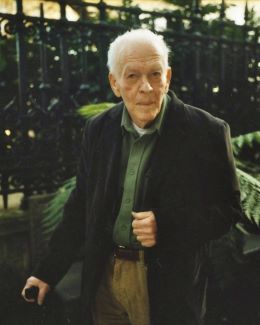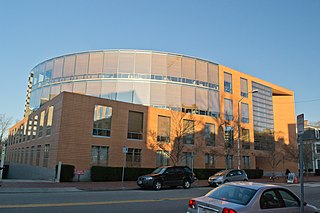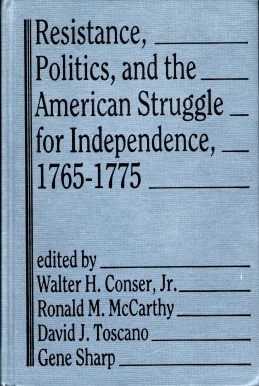
Pacifism is the opposition or resistance to war, militarism or violence. The word pacifism was coined by the French peace campaigner Émile Arnaud and adopted by other peace activists at the tenth Universal Peace Congress in Glasgow in 1901. A related term is ahimsa, which is a core philosophy in Indian religions such as Hinduism, Buddhism, and Jainism. While modern connotations are recent, having been explicated since the 19th century, ancient references abound.

Brandeis University is a private research university in Waltham, Massachusetts. Founded in 1948 as a non-sectarian, coeducational institution sponsored by the Jewish community, Brandeis was established on the site of the former Middlesex University. The university is named after Louis Brandeis, the first Jewish Justice of the U.S. Supreme Court.

Nonviolence is the personal practice of not causing harm to others under any condition. It may come from the belief that hurting people, animals and/or the environment is unnecessary to achieve an outcome and it may refer to a general philosophy of abstention from violence. It may be based on moral, religious or spiritual principles, or the reasons for it may be strategic or pragmatic. Failure to distinguish between the two types of nonviolent approaches can lead to distortion in the concept's meaning and effectiveness, which can subsequently result in confusion among the audience. Although both principled and pragmatic nonviolent approaches preach for nonviolence, they may have distinct motives, goals, philosophies, and techniques. However, rather than debating the best practice between the two approaches, both can indicate alternative paths for those who do not want to use violence. These forms of nonviolence approaches will be discussed in the later section of this article.

Conflict theories are perspectives in sociology and social psychology that emphasize a materialist interpretation of history, dialectical method of analysis, a critical stance toward existing social arrangements, and political program of revolution or, at least, reform. Conflict theories draw attention to power differentials, such as class conflict, and generally contrast historically dominant ideologies. It is therefore a macro-level analysis of society.

Gene Sharp was an American political scientist. He was the founder of the Albert Einstein Institution, a non-profit organization dedicated to advancing the study of nonviolent action, and professor of political science at the University of Massachusetts Dartmouth. He was known for his extensive writings on nonviolent struggle, which have influenced numerous anti-government resistance movements around the world.
Hartal is a term in many Indian languages for a strike action that was first used during the Indian independence movement of the early 20th century. A hartal is a mass protest, often involving a total shutdown of workplaces, offices, shops, and courts of law, and a form of civil disobedience similar to a labour strike. In addition to being a general strike, it involves the voluntary closure of schools and places of business. It is a mode of appealing to the sympathies of a government to reverse an unpopular or unacceptable decision. A hartal is often used for political reasons, for example by an opposition party protesting against a governmental policy or action.

Nonviolence International (NI) acts as a network of resource centers that promote the use of nonviolence and nonviolent resistance. They have maintained relationships with activists in a number of countries, with their most recent projects taking place in Palestine, Sudan and Ukraine. They partnered with International Center for Nonviolent Conflict to update Gene Sharp's seminal work on 198 methods of nonviolent action through a book publication. NI has also produced a comprehensive database of nonviolence tactics, which stands as the largest collection of nonviolent tactics in the world. They partner with Rutgers University to provide the largest collection of nonviolence training materials in the world.
Cultural Survival is a nonprofit group based in Cambridge, Massachusetts, United States, which is dedicated to defending the human rights of indigenous peoples.

Peter Ackerman was an American businessman, the founder and former chairman of Americans Elect, and the founding chair of the International Center on Nonviolent Conflict. Ackerman was the managing director of Rockport Capital, Inc and served as a member of IREX’s Global Advisory Council.
Civil resistance is a form of political action that relies on the use of nonviolent resistance by ordinary people to challenge a particular power, force, policy or regime. Civil resistance operates through appeals to the adversary, pressure and coercion: it can involve systematic attempts to undermine or expose the adversary's sources of power. Forms of action have included demonstrations, vigils and petitions; strikes, go-slows, boycotts and emigration movements; and sit-ins, occupations, constructive program, and the creation of parallel institutions of government.
The International Center on Nonviolent Conflict is an independent, nonprofit educational foundation, founded by Jack DuVall and Peter Ackerman in 2002. It promotes the study and utilization of nonmilitary strategies by civilian-based movements to establish and defend human rights, social justice and democracy.

Nonviolent resistance, or nonviolent action, sometimes called civil resistance, is the practice of achieving goals such as social change through symbolic protests, civil disobedience, economic or political noncooperation, satyagraha, constructive program, or other methods, while refraining from violence and the threat of violence. This type of action highlights the desires of an individual or group that feels that something needs to change to improve the current condition of the resisting person or group.

The Weatherhead Center for International Affairs (WCFIA), formerly Center for International Affairs (CFIA) is a research center for international affairs and the largest international research center within Harvard University’s Faculty of Arts and Sciences. It is sometimes referred to as the Harvard Center for International Affairs.

From Dictatorship to Democracy, A Conceptual Framework for Liberation is a book-length essay on the generic problem of how to destroy a dictatorship and to prevent the rise of a new one. The book was written in 1993 by Gene Sharp (1928-2018), a professor of political science at the University of Massachusetts. The book has been published in many countries worldwide and translated into more than 30 languages. Editions in many languages are also published by the Albert Einstein Institution of Boston, Massachusetts. As of 2012 its current primary English-language edition is the Fourth United States Edition, published in May 2010.
Civilian-based defense or social defence describes non-military action by a society or social group, particularly in a context of a sustained campaign against outside attack or dictatorial rule – or preparations for such a campaign in the event of external attack or usurpation. There are various near-synonyms, including "non-violent defence", "civilian defence" and "defence by civil resistance". Whatever term is used, this approach involves preparations for and use of a range of actions – which can be variously called nonviolent resistance and civil resistance – for national defence against invasion, coup d'état and other threats.

The Politics of Nonviolent Action is a three-volume political science book by Gene Sharp, originally published in the United States in 1973. Sharp is one of the most influential theoreticians of nonviolent action, and his publications have been influential in movements around the world. This book contains his foundational analyses of the nature of political power, and of the methods and dynamics of nonviolent action. It represents a "thorough revision and rewriting" of the author's 1968 doctoral thesis at Oxford University. The book has been reviewed in professional journals and newspapers, and is mentioned on many contemporary websites. It has been fully translated into Italian and partially translated into several other languages.

How to Start a Revolution is a BAFTA Scotland Award-winning British documentary film about Nobel Peace Prize nominee and political theorist Gene Sharp, described as the world's foremost scholar on nonviolent revolution. The 2011 film describes Sharp's ideas and their influence on popular uprisings around the world. Screened in cinemas and television in more than 22 countries it became popular among the Occupy Wall Street Movement. A book of the documentary, Gene Sharp: How to Start a Revolution, was released in October 2020.

Resistance, Politics, and the American Struggle for Independence, 1765–1775 is a book that examines the role of nonviolent struggle in the period before the American Revolution. Edited by Walter H. Conser, Jr., Ronald M. McCarthy, David J. Toscano and Gene Sharp, the book was published in the United States in 1986. It argues that the Stamp Act resistance and other campaigns from 1765 to 1775 were fundamental for shaping the outcome of the struggle for American independence, and were not merely a "prelude" to armed conflict.
Howard Clark was an active pacifist who was Chair of War Resisters' International (WRI) from 2006 until his sudden death from a heart attack. As well as having played an important role in the WRI from the 1980s, he had been an active contributor to the British pacifist magazine, Peace News.













